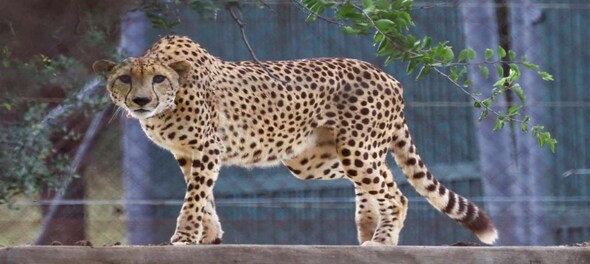
India's cheetah reintroduction project is facing yet another setback after the eighth feline died at Madhya Pradesh's Kuno National Park (KNP) on Friday. The male cheetah, known as Suraj, was found dead in the park. This is the second casualty in four days, and the eighth in nearly four months.
Madhya Pradesh Forest Minister Vijay Shah on Friday said that a postmortem on Suraj is being conducted to assert the cause of death. The Indian government is taking action and the African team has also been contacted, Shah said. He also added that such deaths are "common" among wild animals.
Interestingly, he also said that the government considers this only the third or fourth cheetah death rather than the eighth because the cubs "don't count."
"This is common among wild animals. We don't include the cubs in this but the remaining were due to fights over food or mating. This is common among wild animals... As per us as it is the third or fourth cheetah, we don't count the cubs because they seemed that they would not survive," Shah said.
The recent death of cheetah Tejas, brought from South Africa, revealed in its autopsy report that the cheetah failed to recover from a "traumatic shock" following a violent fight with a female cheetah. Other than Tejas and now Suraj, three other cheetahs and three cubs have already lost their lives in KNP.
Suraj's death adds to the challenges faced by the cheetah reintroduction program initiated by Prime Minister Narendra Modi in September 2022 when eight cheetahs were translocated from Namibia to KNP. Following that, an additional 12 cheetahs from South Africa were translocated in February 2023.
ALSO READ | Supreme Court slams Centre over cheetah deaths, calls for non-political decision to shift to Rajasthan
The Ministry of Environment, Forest and Climate Change acknowledged the complexity and magnitude of the project, emphasising the risks associated with releasing cheetahs into free-roaming conditions due to the absence of fencing in Indian protected areas.
“Due to careful planning and execution, all twenty cheetahs survived the initial capture, quarantine and lengthy transport to the purpose-built quarantine and larger acclimatization camps in KNP in Madhya Pradesh. Releasing the cheetahs into free-roaming conditions poses substantial risks. Like Kuno, no Protected Areas in India are fenced. Animals are thus free to move in and out of the park as they wish. Cheetahs, like other large carnivores, are known to range widely during the initial few months after being reintroduced into unfamiliar open systems. These movements are unpredictable and depend on many factors. After several months the cheetahs should establish their own communication networks and settle down in relatively fixed home ranges. It is important that individual cheetahs do not become totally isolated from the reintroduced group during this phase as they will then not participate in breeding and will thus be genetically isolated,” the ministry said in its statement earlier.
After the monsoon season ends in September, the ministry plans to reassess the situation and proceed with further releases into KNP or surrounding areas, as outlined in the Cheetah Conservation Action Plan. The goal is to establish a metapopulation, including areas such as Gandhisagar.
The fatalities among the cheetahs involved in the project thus far are as follows:
# Sasha, a six-year-old female from Namibia, fell ill in late January and succumbed to chronic renal insufficiency in March. The captive cheetah received stabilization efforts but eventually passed away. The disease, which progresses slowly, poses no risk to other cheetahs involved in the project.
# Uday, an adult male from South Africa, exhibited acute neuromuscular symptoms shortly after his release from quarantine in April. Despite symptomatic treatment, he died from cardiopulmonary failure. The cause of his initial symptoms and the potential significance of brain haemorrhage require further investigation.
# Daksha, a female cheetah, died after a violent interaction with a male during a mating attempt.
# Three India-born cheetah cubs died on May 23 due to weakness and sweltering heat.
First Published: Jul 14, 2023 5:20 PM IST
Check out our in-depth Market Coverage, Business News & get real-time Stock Market Updates on CNBC-TV18. Also, Watch our channels CNBC-TV18, CNBC Awaaz and CNBC Bajar Live on-the-go!


2024 Lok Sabha Elections | What does a low voter turnout indicate for NDA and I.N.D.I.A Bloc
Apr 29, 2024 5:48 AM
'Borrowed' leaders: Congress hits out at AAP for not fielding their own candidates in Punjab
Apr 28, 2024 9:53 PM
EC asks AAP to modify election campaign song and Kejriwal's party is miffed
Apr 28, 2024 9:25 PM

